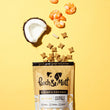
FREE UK DELIVERY ON ORDERS OVER £39.99
Sounds unusual, we know - but reverse sneezing is quite a common phenomena in dogs that might have you feeling a little unsettled when it happens. Read on for a basic explanation of reverse sneezing in dogs and what you can do if and when your pooch gets an attack of these backwards bursts.
Unlike regular sneezing (when a dog will eject air outwards through the nose), reverse sneezing has air sucked back, causing your dog to make a cough-snort sound. It isn’t painful for the dog, but it is involuntary, and they might do it repeatedly for 10 or 15 seconds - or even longer.
‘Reverse sneezing’ or ‘backwards sneezing’ is usually a result of irritation at the back of the throat, causing a spasm of the muscles between the throat and nose. Your dog will abruptly inhale or snort as if sneezing backwards as a result of the tickling sensation.
Unsurprisingly, reverse sneezing is most common in dog breeds with flat noses and shorter snouts (called Brachycephalic breeds), such as Pugs, Boxers and Shih Tzus. But any dog or breed can be the victim of reverse sneezing too!
As reverse sneezing is caused by throat irritation, it will be more likely to happen to your pooch in the following scenarios:
Sometimes, however, there won’t be any obvious reason for reverse sneezing, especially if their breed is prone to the phenomena (read on for a list of breeds that commonly reverse sneeze).

Reverse sneezing is common, therefore not considered dangerous. If you have a Pug, Shih Tzu or other squat-nosed pooch, it’s just part of having a flat-faced breed. If it happens a lot, however - so much that it seems to impact their quality of life or significantly disturbs their day-to-day, you might want to see a vet for possible treatment.
When a dog reverse sneezes their throat muscles are irritated, therefore their trachea shortens and they’re forced to lift their head and sharply inhale, causing a cough or snort sound. It’s the same reflex as a regular sneeze, except whereas a usual sneeze is to settle an irritation in the nose, a reverse sneeze is focused at the back of the throat.
A dog’s ‘backwards sneeze’ will sound more like a snort or cough - and it’s sometimes called ‘snorking’. It can be concerning to a pooch parent because you may think your dog is choking, due to the throat-based, guttural noise - however a reverse sneeze is usually completely safe.
A dog might reverse sneeze just once before their irritation is soothed, or it might be more of a reverse sneezing episode lasting around 10 to 15 seconds (or longer). If your dog reverse sneezes for an extended time (repeatedly sneezing throughout a period of an hour or more, for instance), they may have something in their throat or be suffering from an allergy, and you should contact your vet.
Dogs with short snouts and flat noses, also called Brachycephalic dog breeds, are more prone to reverse sneezing. This includes squat-nosed dogs such as: Pugs Bulldogs Boxers Shih Tzus Pekingese Bull Mastiffs Cavalier King Charles Spaniels However, all dog breeds can suffer from the occasional bout of reverse sneezing.
Reverse sneezing isn’t really a cause for concern; your dog will usually be overexcited or clearing their airways from dust or irritants. Take note if your pooch reverse sneezes a lot, and especially if they have extended episodes which interrupt their daily routine or seem to distress them; this could be a reason to take your dog to a vet for more advice.
Reverse sneezes are no reason to panic, so be sure to demonstrate a sense of calmness to your pooch when it happens. Here are some suggested techniques to help the episode pass a little quicker:
If you think the reverse sneezing is due to overexcitement or movement, take them to a calmer environment, give them some attention and softly massage their throat until it passes.
Intervening when your dog is reverse sneezing is not essential. Resident Vet Linda says:
"Most vets advise you to do nothing at all. The reverse sneezing should stop with no intervention."
You might worry about your overly ‘snorking’ dog and wonder, “Is reverse sneezing dangerous?”. As we’ve said, it isn’t generally anything to worry about and is relatively common for dogs, especially flat-nosed breeds. If your dog seems distressed by an apparent reverse sneezing episode, they reverse sneeze continually or they appear to be choking instead, this is the time to urgently take your dog to the vet.
Reverse sneezing can sound like your dog is choking as it’s based in the throat muscles - however it’s relatively easy to tell the difference. If your pooch ‘snorks’ for a long time, seems in relative distress, or is drooling, retching or pawing at their face, they could be choking on something. Of course, it’s more likely to be choking if your pooch has been eating something that may have gotten lodged in their throat. If you don’t feel you can remove the choking item yourself, take them urgently to a vet.

You’ll know your dog is reverse sneezing as it will be over quickly (either immediately or within 20 seconds or so - however it’s worth noting episodes can last a couple of minutes) - and it usually occurs when your pooch inhales dust or allergens, is overexcited or eating too quickly. If you take your dog to a vet, they would diagnose reverse sneezing by asking you about the frequency of sneezing episodes, observing your dog’s behaviour and doing some examinations on your dog’s throat. They can also rule out any other potential conditions with this check-up.
If your dog reverse sneezes so much that it’s affecting their quality of life, or they seem very distressed by each sneezing episode, you should take them to a vet to assess possible treatment. They could have a different throat or sinus condition so it’s important they get checked over to be sure.
Tracheal collapse in dogs is when the windpipe (trachea) becomes weak and loses rigidity, causing the poor pooch to suffer as it becomes awkward to breathe. They may choke or splutter when experiencing tracheal collapse. It will seem more severe than simple reverse sneezing, but they can be mistaken for each other.
Dogs with congestive heart failure have problems breathing due to their heart not being able to sufficiently pump blood around the body, which can lead to a build-up of fluid. Dogs with this heart condition may cough, wheeze and exhibit distress when trying to breathe. They may reverse sneeze occasionally as a result of fluid in the body, but congestive heart failure is a very separate condition to reverse sneezing.
As it’s not a serious condition, reverse sneezing is more about keeping your pooch comfortable and away from triggers as much as possible. Read on for tips on how to prevent reverse sneezing in your dog, and stop it when it starts:
If your dog tends to frequently get an attack of backwards sneezing, try the following preventative measures to keep them relaxed and less likely to be triggered: Reduce allergens as much as you can. If you find your dog is sensitive to dust, particular cooking smells or overpowering flowery scents in the house, keep those scents as unobtrusive as possible, or at a distance from your dog (e.g. cooking spicy food when your dog is out for a walk).
In general, you’ll want to make sure your dog is able to breathe freely in the home without being triggered. Take some time to assess whether your dog has specific allergies that make them sneeze. Keep your pooch calm. Dogs get excitable, that’s a given - but try not to work them up too much if it often causes them to reverse sneeze. Pre-empt excitable times by giving them calming dog food or a calming dog treat. Have lots of water around. Your dog will need to drink and keep hydrated to keep their throat clear and soothed.
If your pooch keeps reverse sneezing, either in one single episode or if it’s a daily occurrence, take them to a vet for a check-up. Your poor ‘snorking’ pooch shouldn’t have to put up with daily reverse sneezing attacks, and with a light rearranging of their diet, routines or environment, they could sneeze significantly less.
Got a dog that reverse sneezes a lot when excited? Bolster their diet with our Calm & Relaxed range, including grain-free calming dog food to help keep their demeanour steady and breathing smooth. If you have more questions about reverse sneezing and your dog, feel free to get in touch with us.





Never miss a treat!
Subscribe to our newsletter and get blog articles amongst other treats delivered to your inbox







Comments (0)
Leave a comment